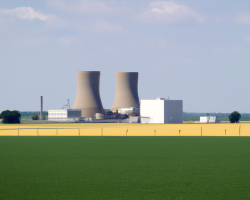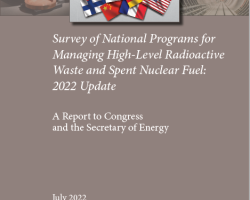Category of Content
Siting Experience Documents Only
Publication Date
Subject Matter
Effects of Lower Drying-Storage Temperatures on the DBTT of High-Burnup PWR Cladding
Effects of Lower Drying-Storage Temperatures on the DBTT of High-Burnup PWR Cladding
Hydride Rim Formation in Unirradiated Zircaloy
Hydride Rim Formation in Unirradiated Zircaloy
Dual-Purpose Canister Filling Demonstration Project Progress Report
Dual-Purpose Canister Filling Demonstration Project Progress Report
Influence of Nuclear Fuel Cycles on Uncertainty of Long-Term Performance of Geologic Disposal Systems
Influence of Nuclear Fuel Cycles on Uncertainty of Long-Term Performance of Geologic Disposal Systems
Effects of Multiple Drying Cycles on High-Burnup PWR Cladding Alloys
Effects of Multiple Drying Cycles on High-Burnup PWR Cladding Alloys
Effects of Lower Drying-Storage Temperature on the Ductility of High-Burnup PWR Cladding
Effects of Lower Drying-Storage Temperature on the Ductility of High-Burnup PWR Cladding
Public Preferences Related to Consent-Based Siting of Radioactive Waste Management Facilities for Storage and Disposal: Analyzing Variations over Time, Events, and Program Designs ?
Public Preferences Related to Consent-Based Siting of Radioactive Waste Management Facilities for Storage and Disposal: Analyzing Variations over Time, Events, and Program Designs ?
FY 2014 PNNL Zr Cladding Testing Status
FY 2014 PNNL Zr Cladding Testing Status
Report on UQ and PCMM Analysis of Vacuum Drying for UFD S&T Gaps
Report on UQ and PCMM Analysis of Vacuum Drying for UFD S&T Gaps
Covariance Data for Used Nuclear Fuel Uncertainty Analysis
Covariance Data for Used Nuclear Fuel Uncertainty Analysis
Verification and Validation Strategy for Implementation of Hybrid Potts-Phase Field Hydride Modeling Capability in MBM
Verification and Validation Strategy for Implementation of Hybrid Potts-Phase Field Hydride Modeling Capability in MBM
Documentation of Hybrid Hydride Model for Incorporation into Moose Bison and Validation Strategy
Documentation of Hybrid Hydride Model for Incorporation into Moose Bison and Validation Strategy
Public Views about Storage and Disposal Options for Spent Nuclear Fuel. Energy and Environment Survey, 2017
Public Views about Storage and Disposal Options for Spent Nuclear Fuel. Energy and Environment Survey, 2017
Model for Simulation of Hydride Precipitation in Zr-Based Used Fuel Claddings: A Status Report on Current Model Capabilities
Model for Simulation of Hydride Precipitation in Zr-Based Used Fuel Claddings: A Status Report on Current Model Capabilities
Optimization of Hydride Rim Formation in Unirradiated Zr-4 Cladding?
Optimization of Hydride Rim Formation in Unirradiated Zr-4 Cladding?
Modeling and Simulation of Used Nuclear Fuel During Transportation with Consideration of Hydride Effects and Cyclic Fatigue
Modeling and Simulation of Used Nuclear Fuel During Transportation with Consideration of Hydride Effects and Cyclic Fatigue
Modeling of hydride precipitation and reorientation
Modeling of hydride precipitation and reorientation
Roadmap for Developing a Computation Tool for Prediction of Hydride Precipitation and Reorientation during Long-Term Dry-Storage
Roadmap for Developing a Computation Tool for Prediction of Hydride Precipitation and Reorientation during Long-Term Dry-Storage
Modeling Hydride Reorientation in Cladding
Modeling Hydride Reorientation in Cladding
White Paper Summary of 2nd ASTM International Workshop on Hydrides in Zirconium Alloy Cladding
White Paper Summary of 2nd ASTM International Workshop on Hydrides in Zirconium Alloy Cladding
Intergenerational Ethical Issues and Communication Related to High-Level Nuclear Waste Repositories
Intergenerational Ethical Issues and Communication Related to High-Level Nuclear Waste Repositories
Purpose of Review: The nuclear power industry started in the 1950s and has now reached a phase of disposing high-level nuclear waste. Since the 1980s, the United Nations has developed a concept of sustainable development and governments have accordingly made ethical commitments to take responsibility towards future generations. The purpose of this review is to examine ethical dilemmas related to high-level nuclear waste disposal in a long-term perspective including potential access to the waste in the future.
Science based responses to social myths on nuclear energy
Science based responses to social myths on nuclear energy
In order to promote a sound basis for considering the role of nuclear in climate change, this review spans the technical topics of social and political debate surrounding nuclear energy with a focus on the objective science of these issues including nuclear waste, accidents and overall risk. Novel aspects include the emergence of nuclear energy as being potentially renewable and the antithesis of Fukushima being an argument for the unacceptable risks associated with the use of nuclear energy.
Survey of National Programs for Managing High-Level Radioactive Waste and Spent Nuclear Fuel: 2022 Update
Survey of National Programs for Managing High-Level Radioactive Waste and Spent Nuclear Fuel: 2022 Update
In October 2009, the U.S. Nuclear Waste Technical Review Board (Board or NWTRB) published Survey of National Programs for Managing High-Level Radioactive Waste and Spent Nuclear Fuel. For each of the 13 national programs studied, the report catalogued 15 institutional arrangements that had been set in place and 15 technical approaches that had been taken to design repository systems for the long-term management of high-activity radioactive waste.


